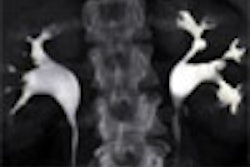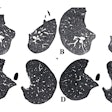At a recent U.S. Senate Cancer Coalition hearing, a senator and several colon cancer screening experts spoke of the need to increase screening compliance, and about the role of virtual colonoscopy in those efforts.
Among the speakers at the March 16 hearing was U.S. Sen. Dr. Tom Coburn, a physician specializing in family medicine, obstetrics, and allergy, and a survivor of two kinds of cancer, including colorectal cancer. In addition, Dr. George Mensah, acting director of the National Center for Chronic Disease Prevention and Health Promotion at the Centers for Disease Control and Prevention (CDC) in Atlanta, talked about the difference screening can make in colorectal cancer mortality. And Dr. Abraham Dachman, professor of radiology and director of CT at the University of Chicago, recommended the use of virtual colonoscopy as a front-line screening exam.
"I advocate that you take steps to extend coverage for CT colonography as a means to improve compliance for colon cancer screening," Dachman said, according to an advance copy of his remarks provided to AuntMinnie.com. "There is a growing body of scientific literature that shows that CT colonography (VC) is safe, cost-effective, highly acceptable to patients, and accurate. It has been shown to be superior to barium enema. Since barium enema is a covered service for colorectal cancer screening, then so should CT colonography."
VC offers a number of advantages over other tests for colon cancer screening, Dachman said. It is less invasive than conventional colonoscopy since the entire colon is navigated not by a scope but by CT as a "virtual camera," he explained, and VC reduces the risks of perforation and bleeding that are known to occur with conventional colonoscopy.
Moreover, VC does not require sedation, considerably reducing the total cost of the exam and allowing a patient to drive or return to work immediately after the test. The exam can be performed in 15 minutes or less, and although it generally requires thorough cleansing of the bowel prior to imaging, emerging techniques suggest that unpleasant bowel preparations may not be necessary, Dachman said.
"When performed using the latest techniques, CT colonography has been shown to be equivalent to conventional colonoscopy for screening. This was documented in the largest clinical trial to date, published recently in the New England Journal of Medicine," he said (NEJM, December 4, 2003, Vol. 349:23, pp. 2191-2200).
While VC has captured the attention of the public and driven interest in colon cancer screening, the test is not covered by federal programs and therefore unavailable to most Americans, he said. In contrast, Medicare currently covers preventive colon cancer screening by colonoscopy every 10 years, flexible sigmoidoscopy or double-contrast barium enema screening every four years, or annual fecal occult blood tests.
"I advocate that you take steps to extend coverage for CT colonography as a means to improve compliance for colorectal cancer screening," Dachman said.
Since barium enema is a covered service for colorectal cancer screening, then CT colonography should also be covered, Dachman concluded. Reimbursement for VC is needed in order to encourage radiologists to invest in learning how to perform the procedure, Dachman said.
Dr. George Mensah testified about the importance of improving colon cancer screening compliance.
Colorectal cancer is the second leading cause of cancer-related death in the U.S., after lung cancer, Mensah said, according to a copy of his prepared remarks. In 2005 it is estimated that 56,300 Americans will die from colorectal cancer and approximately 145,300 new cases will be diagnosed, he added.
"Despite evidence demonstrating the effectiveness of colorectal cancer screening tests, colorectal cancer screening lags far behind screening for other cancers, such as breast and cervical cancers," Mensah said. "Based upon (the CDC's) 2000 National Health Interview Survey (NHIS) published in Cancer, only 42.5% of adults 50 years or older (45% of men and 41% of women) had been screened according to the current guidelines."
New techniques such as DNA testing and virtual colonoscopy are promising -- and are being used in some healthcare settings, Mensah continued. "However, data are not yet sufficient to support these tests for widespread colorectal cancer screening," he said. "Until these new technologies are deemed safe and more effective for the public, we need to focus on promoting broader use of the currently recommended tests for colorectal cancer."
In other colon screening news, the American College of Gastroenterology (ACG) has recommended that colorectal cancer screening begin at age 45 rather than age 50 for African Americans, citing a higher prevalence of colon cancer in this population.
"The mean age of (colorectal cancer) development in African Americans is younger than that of whites," states an article in the March issue of the American Journal of Gastroenterology. "There is also evidence for a more proximal colonic distribution of cancers and adenomas in African Americans. African Americans are less likely to have undergone diagnostic testing and screening for colorectal cancer. Special efforts are needed to improve colorectal cancer screening participation rates in African Americans" (American Journal of Gastroenterology, March 2005, Vol. 100:3, pp. 515-523).
The article was written by members of the ACG's committee on minority affairs and cultural diversity.
By Eric Barnes
AuntMinnie.com staff writer
March 28, 2005
Related Reading
Multicenter VC trial begins with high hopes, state-of-the-art protocol, March 1, 2005
Duke VC trial results disappointing, November 1, 2004
Gastroenterology warning: Prepare for VC or regret it, October 6, 2004
What virtual colonoscopy misses might not matter, August 18, 2004
Politics matters in the real world of virtual colonoscopy, November 5, 2003
Copyright © 2005 AuntMinnie.com




















